
In Cooperation With:
Japan:Public Opinion Research Institute Corporation
China:China Daily, Horizon Research Consultancy Group
September 9th, 2014
Survey Overview
During July and August this year, The Genron NPO and China Daily conducted joint opinion polls targeting the citizens of Japan and China. This is the 10th annual opinion poll; these polls have been jointly conducted since 2005 when Japan-China relations were at their lowest. The objective of the survey is to continuously monitor the state of mutual understanding and perceptions of the Japanese and Chinese public toward each other, and their changes over time.
The Genron NPO and China Daily have conducted annual polls since 2005 and used the results as the basis for discussion during the Tokyo-Beijing Forum in order to contribute to a dialogue aimed at closing the gaps in communication and mutual understanding between the two nations.
The opinion poll in Japan was conducted from July 24th to August 10th, by the placement (self-administered) method, targeting men and women over the age of 18 (excluding high school students). The total number of valid responses obtained was 1,000. The highest levels of educational attainment of the respondents were as follows: high school diploma 45.8%, junior college/technical college diploma 16.7%, bachelor's degree 25.2% and master's degree 1.6%.
The opinion poll in China was conducted from July14th to 25th, through the interview method targeting men and women over the age of 18 in five cities: Beijing, Shanghai, Chengdu, Shenyang and Xi'an. The number of total valid responses obtained was 1,539. The samples were selected through the multistage random sampling method in each city. The highest levels of educational attainment of the respondents were as follows: up to junior high school diploma 25.4%, high school/technical high school diploma 49.2%, technical college diploma 16.5%, bachelor's degree 8.5% and master's degree 0.4%.
Impressions of Each Other's Country among Japanese and Chinese Public
The Japanese public regards China's powerhouse-like acts as the reason for the worsening impression of China. For the Chinese public, although having decreased since last year, Senkaku/Diaoyu and Japanese historical understanding are still prominent.
On the other hand, Chinese respondents who have an "Unfavorable" impression of Japan were 86.8%. It is still at a high level, yet it has improved since last year when the unfavorable impression hit the highest level on record at 92.8%. Further, "favorable" (including "relatively favorable") impression more than doubled since last year from 5.2% to 11.3% this year.
Nevertheless, on "The change in impressions of one another's countries over the past year," 66.7% (34.3%) of Japanese respondents and 57.3% (14.0% last year) of Chinese respondents answered that the impression toward each other's country has "worsened," and there are significant increases in both countries' polls.
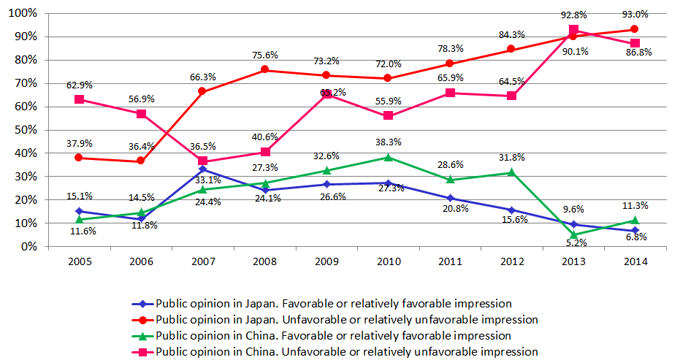
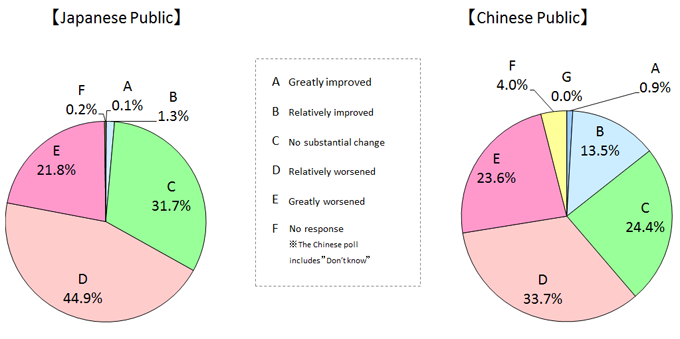
Reasons behind the Impressions between the Two Countries
The Japanese public regards China's powerhouse-like acts as the reason for the worsening impression of China. For the Chinese public, although having decreased since last year, Senkaku/Diaoyu and Japanese historical understanding are still prominent.
On the other hand, in the reasons why the Chinese respondents have an "unfavorable" impression of Japan, "The Diaoyu/Senkaku Islands" and "Historical understanding" were the two prominent answers, which is the same as last year's result. Yet, it is worth noting that there were decreases in the number of people who raised these two reasons. In contrast, there is an increase in people who chose "Some Japanese politicians' careless remarks" at 31.3% (25.2% last year), and this indicates more people have an unfavorable impression due to Japanese politicians' inappropriate words and actions.
In the reasons for a "favorable" impression, "because of direct interaction with Chinese people, particularly with Chinese students in Japan, they are becoming familiar" was the most common answer by the Japanese respondents at 39.7% (32.3% last year). This shows that private interaction contributed to the "favorable" impression of China.
Among the reasons why the Chinese respondents had a "favorable impression," "Japanese products are high quality" (57.2%, 49.4% last year), "Japanese people are earnest and hardworking" (53.8%, 54.4% last year), and "Japanese people are kind and have good manners and high cultural standards" (52.6%, 39.2%) were the most common answers with more than half of the respondents choosing the answers. These results imply that the high trust of Japan's manufacturing technology and the highly valued Japanese national character contributed to the "favorable" impression of Japan. "Remarkable economic growth after WWII" has decreased by 30 percentage points from 49.4% last year to 19.7% this year.
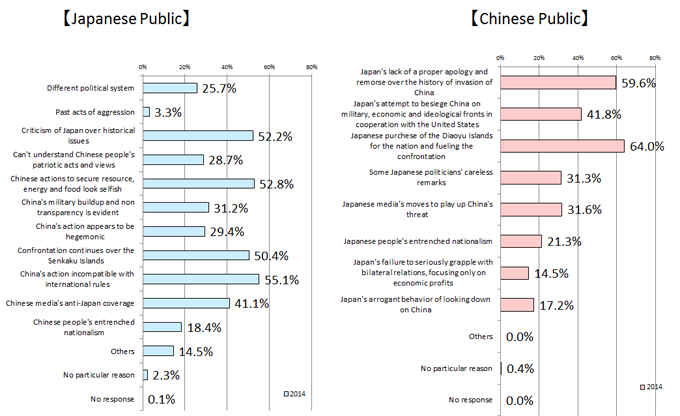
How the Japanese and Chinese public View the Current Worsening National Sentiments
About 80% of the Japanese public and 70% of the Chinese public expressed concern over the deteriorating national sentiments as "This is an undesirable situation, I have concerns" and "The situation is a problem and it needs to be resolved."
This was the same for the Chinese respondents as 35.2% chose "this is an undesirable situation, I have concerns" and another 35.2% chose "The situation is a problem and it needs to be resolved." This shows 70% see the current state of national sentiment as a problem.
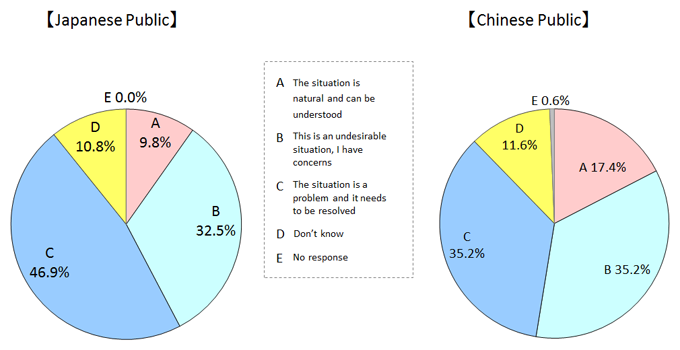
Did Mutual Understanding between the Two Countries Improve?
Overheated issues of "territory" and "history" are begging to calm down.
"What comes to mind" when you think of Japan, for the Chinese respondents, "The Diaoyu/Senkaku Islands" (46.6%, 57.5% last year) and "Nanjing Massacre" (35.3%, 50.3% last year) are still the most common answers. However, significant decreases can be observed in comparison to last year's results, which also shows signs of calming in China. The non-political options such as "Japanese cuisine" (16.4%, 9.5% last year), "Mt. Fuji" (12.5%, 9.7% last year) show increases in this year's poll. This could also be considered as evidence of the situation having calmed down.
On the question "Historical events and incidents in one another's country that you know," the most common answer from the Japanese respondents was "Senkaku boat collision incident" at 79.2%, and as a whole it is noticeable that recent events left a strong impression on the Japanese public's mind. That said, throughout the pre- and post-WWII era, around 20% of the Japanese respondents know most of the historical events in China. This shows a relatively wide range of knowledge and understanding of Chinese history by the Japanese public.
On the Chinese side, the answer "Manchurian Incident, Lugouqiao (Lugou Bridge) Incident and Nanjing Massacre" (76.5%, 91.4% last year) maintained its prominence among the Chinese respondents. This is followed by "Japan's purchase of the Diaoyu Islands," which option is newly created for this year's survey, at 49.6%. As a whole, historical wars and related events are prominent in the Chinese public's knowledge of Japan while understanding of post-WWII events in Japan was scarce: Around 10% of the Chinese respondents chose these options. That said, recent events related to Japan-China relations such as "Japan's purchase of the Diaoyu Islands" and "Prime Minister Abe's visit to Yasukuni Shrine" (24.9%) are relatively well known among the Chinese public.
In response to the question "Chinese politicians that you know," "Mao Zedong" (92.0%, 90.1% last year) topped the poll by the Japanese respondents, and Chinese leaders in the 20th century are relatively well known. However, "Xi Jinping" remains at 58.8% (48.3% last year), therefore it indicates that 40% of the Japanese public still do not know the Chinese leader. Chinese Prime Minister "Li Keqiang" was also at a mere 10.1% (8.0% last year).
For the "Japanese politicians" whom Chinese respondents know, the answer Japanese Prime Minister "Shinzo Abe" has increased from 47.4% last year to 75.2% this year. This is followed by "Junichiro Koizumi" at 42.8% (50.2% last year).
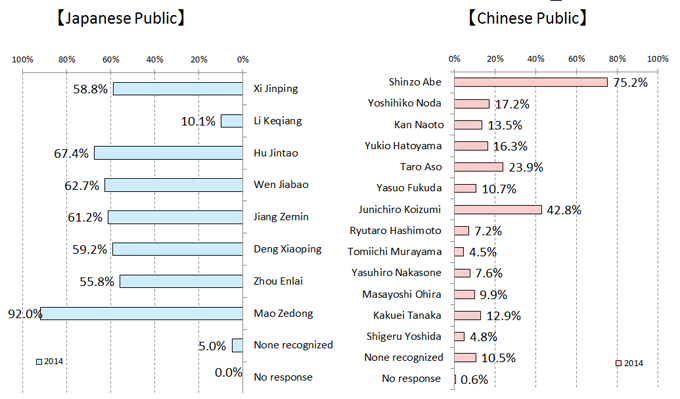
Perception of Social/Political Systems of One Another's Countries
Japanese public think that China's social/political system is "Socialism/communism." The Chinese public's perceptions of Japan as "Hegemonism" and "Militarism" have decreased, yet still 30% think the same.
On the other hand, the most common answer among the Chinese respondents was "Capitalism" at 39.7% (42.1% last year). In last year's survey, which was conducted right after the nationalization of the Senkaku (Diaoyu) Islands by Japan, "Hegemonism" had increased sharply to 48.9% last year, but it has calmed down to 36.7% this year. "Militarism" has also decreased from 41.9% (last year) to 36.5%, yet still close to 40% of the Chinese public regard Japan as a military power. During the past 10 years, "Militarism" and "Ethnicism" have steadily decreased since 2005 when "Militarism" was 60.3% and "Ethnicism" was 49.5%, which has halved to 25.8% in this year's poll.
Instead, what have increased in the past 10 years are "Nationalism" and "Hegemonism." In comparison to past results, "Nationalism" has increased by 10 percentage points from 27.5% in 2006 to 37.5% this year, and "Hegemonism" has also increased by more than 10 percentage points from 22.4% in 2010.The "Pacifism" (10.5%, 11.8% in 2005), "Democracy" (14.4%, 23.7% in 2005) and "International cooperation" (6.7%, 13.9% in 2005) that Japan has advocated to the world since the end of WWII, remains at around 10%, which has even declined since the first annual poll 10 years ago.
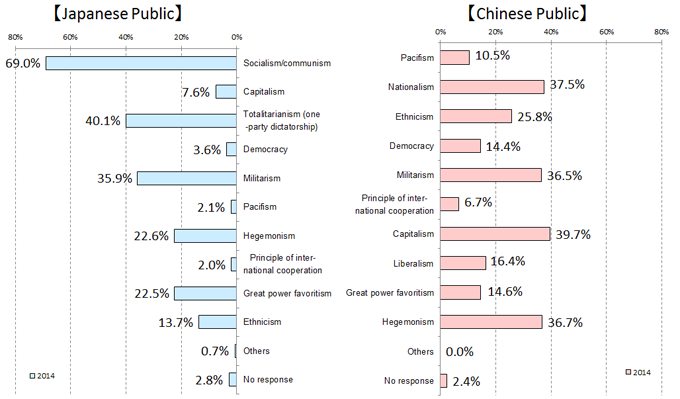
How the Respective Countries View One Another's National Character?
The Japanese public's perception of the Chinese national character is worsening, but the Chinese public's perception of the Japanese national character shows a slight improvement.
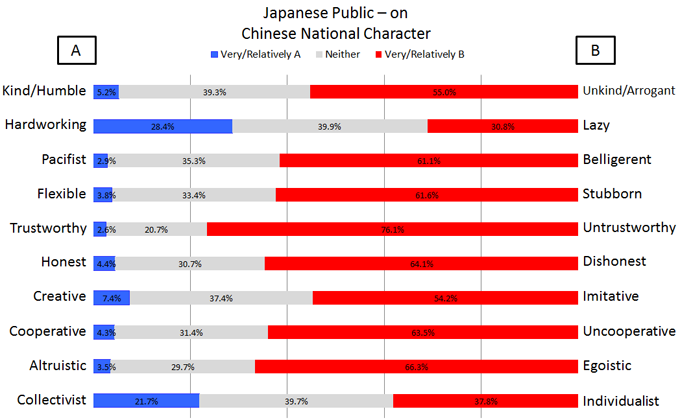
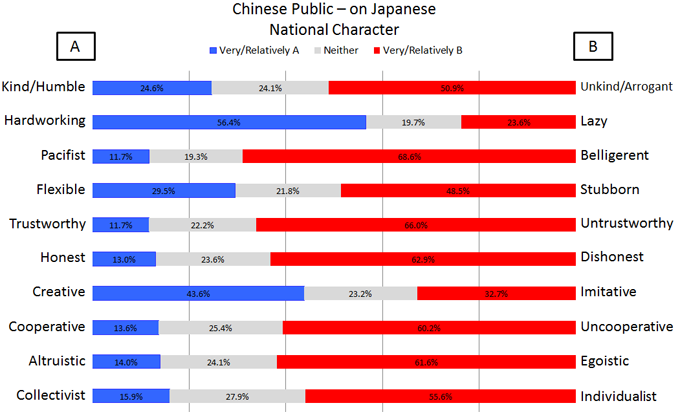
How Current and Future Japan-China Relations Are Viewed by the Japanese and Chinese Public
The latest survey showed more than 80% of the Japanese polled believed that Japan-China relations are "bad," which outnumbered last year's figure. However, 67.2 % of the Chinese polled believed that China-Japan relations are "bad," which dropped by 20 percentage points in comparison with last year. It suggests a slow improvement in the public perceptions of China-Japan relations on the Chinese side. With regards to bilateral relations in the future, both Japanese and Chinese expect worsening relations between the two countries, indicating a spread of pessimistic views about the course of Japan-China relations on both sides.
For the Chinese counterparts, the negative evaluation of the China-Japan relationship ("bad" and "relatively bad") declined from 90.3% last year to 67.2%. Chinese public perception of bilateral relations between China and Japan has slightly improved since Japan nationalized the Senkaku Islands. This year's 67.2% is higher than the 54.9% in 2005. The worsening relations between Japan and China have not substantially improved.
Pessimistic views about prospective Japan-China relations prevailed in two countries. The percentage of Japanese expecting even worse bilateral relations in the years ahead increased to 36.8% from 28.3% last year. Only 8% of Japanese polled believed the Japan-China relations "will improve" or "will probably improve."
The negative evaluation of prospective China-Japan relations on the Chinese side also grew to 49.8% from 45.3% last year. This figure was higher than the worst record of 46.6% in 2005. 17.7% of Chinese believed that bilateral relations "will improve" or "will probably improve," which slightly increased from 15.1% last year.
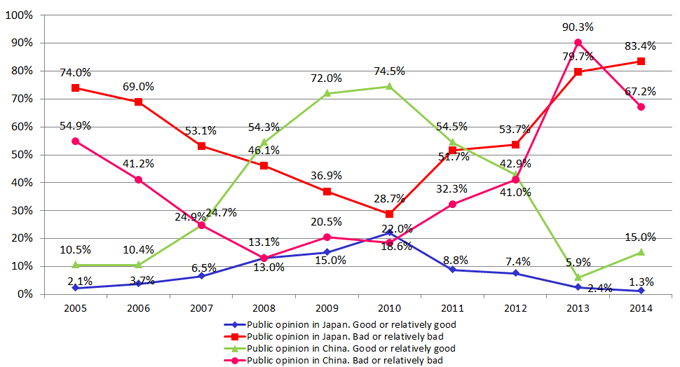
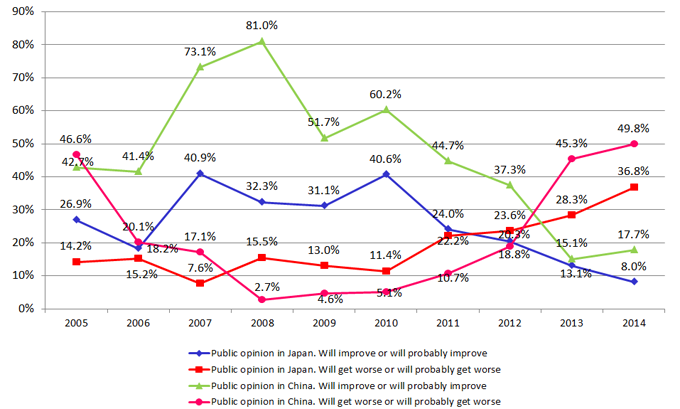
"Territorial Issue" Is the Biggest Concern for Improvement of Japan-China Relations
Although the major source of concern perceived by both Japanese and Chinese is the "territorial issue," it is on a declining trend. The concern for the absence of mutual trust between citizens in the two countries and the two governments has become prominent.
64.8% of Chinese respondents believed that the "territorial issue" was the biggest concern. This result is consistent with previous surveys. However, it dropped by 12 percentage points from 77.5% last year. 31.9% of Chinese showed concerns on "Japan's historical understanding and historical education." It dropped slightly from 36.6% last year. It is similar to Japan. "Lack of trust between the Chinese and Japanese governments" (25.4%) and "lack of trustful relations between Chinese and Japanese people" (15.5%) were regarded as major barriers to bilateral relations.
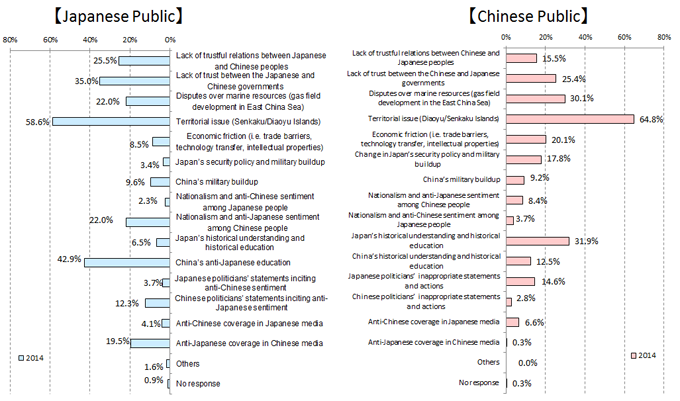
How the Importance of Japan-China Relations Is Viewed
Despite the worsening Japan-China relations, 70% of Japanese and 60%of Chinese believed the bilateral relationship is important. The awareness about the importance of the two countries relations is on a declining trend. In particular, it has declined considerably in China since 2010.
65.0 percent of Chinese respondents viewed the China-Japan relationship as important. However, the percentage dropped from 72.3% last year and was the lowest during the past 10 years. In particular, 92.5% of Chinese regarded bilateral relations as important in 2010, which indicates a significant drop of 30 percentage points.
As reasons for the importance of Japan-China relations, 55.8% of Japanese and 29.4% of Chinese regarded "the cooperation between Japan and China is indispensable to peace and prosperity in Asia." "The two countries are the world's No. 2 and No. 3 economic powers" (48.6%) and "the two countries are neighbors" (45.5%) were the two most popular reasons for the importance of Japan-China relations among the Chinese public. The reasons for the importance of bilateral relations in China largely derive from the consideration of realistic interests.
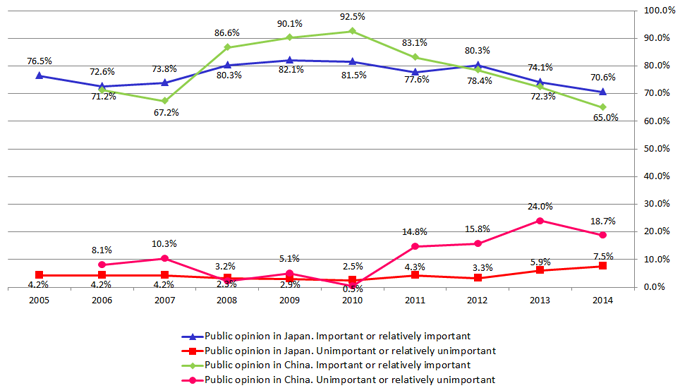
The Importance of the bilateral relationships between Japan, China and the U.S. and affinity toward respective countries
The Japanese and Chinese polled viewed that the relations between Japan and China were as important as the relations between their respective country and the United States. More than half of the Japanese polled felt more affinity toward the United States. Most Chinese respondents reported they felt no affinity toward either Japan or the United States.
40.3% of Chinese regarded China-Japan relations and China-U.S. relations were equally important. It dropped largely from 54.2% last year. Conversely, the percentage of Chinese who viewed China-Japan relations more important increased to 22.0% from 10.2% last year. 22.5% of Chinese viewed China-U.S. relations were more important, which was as high as the percentage last year (24.0%).
In addition, 55.7% of Japanese felt more affinity toward the United States than China. Only 5.6% of Japanese felt more affinity toward China than the United States. 44.4% of Chinese respondents (50.3% last year) felt no affinity toward either Japan or the United States. 30.7% of Chinese (28.1% last year) felt more affinity toward the United States while only 4.4% of Chinese (3.0% last year) felt more affinity toward Japan.
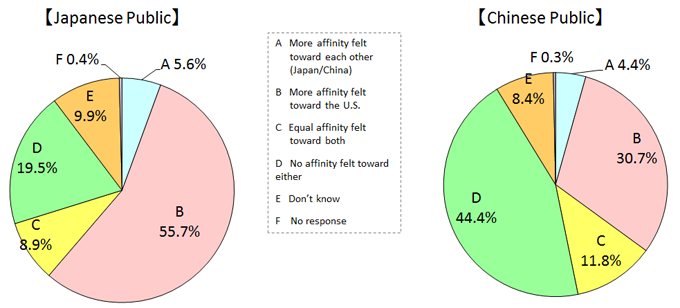
Japan-China, Japan-South Korea and China-South Korea Relations, and their importance and affinity
Chinese polled put more emphasis on China-South Korea relations than China-Japan relations. More than half of the Japanese polled felt more affinity toward South Korea than China.
43.5% of Chinese viewed China-Japan relations and China-South Korea relations were equally important. 33.3% of Chinese regarded China-South Korea relations were more important than China-Japan relations. Only 6.5% of Chinese viewed China-Japan relations more important.
37.2% of Japanese (45.5% last year) felt more affinity toward South Korea than China. Only 5.0% of Japanese (5.9% last year) felt more affinity toward China. 31.8% of Japanese (24.6% last year) felt no affinity toward either China or South Korea.
However, 52.7% of Chinese felt more affinity toward South Korea and Japan while only 3.5% of Chinese felt more affinity toward Japan. 21.8% of Chinese felt no affinity toward either Japan or South Korea.
※This particular question was included in the Chinese questionnaire only. Japanese results are from the 2nd Japan-South Korea opinion poll, which was conducted from May to June 2014.
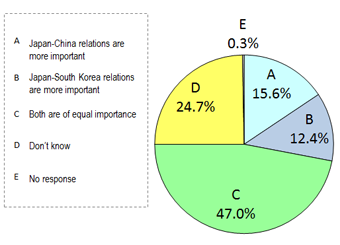
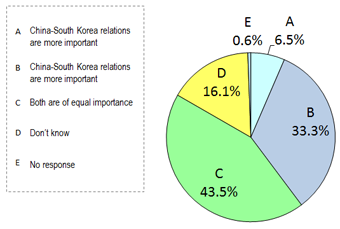
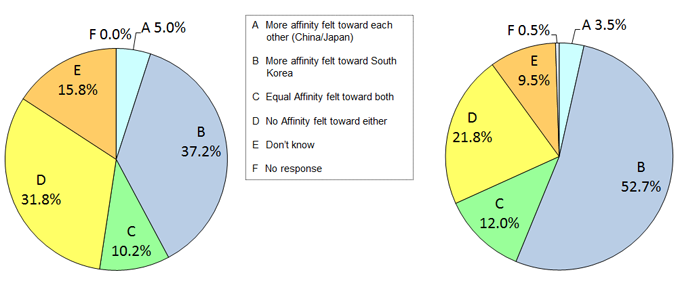
The Prospects for Cooperation between Japan and China
More than 60% of Japanese and 50% of Chinese endorsed the cooperation of the two countries in the face of important issues in Asia. Nearly 30% of Chinese opposed cooperation with Japan.
On the question of issues that require Japan-China cooperation, "Environmental issues such as air pollution" (85.6%, 81.9% last year) and "Food safety" (80.2%, 67.1% last year) were the most prominent answers by the Japanese respondents, this implies that there are raising concerns on immediate and tangible issues that require cooperation between Japan and China. These are followed by "North Korea's nuclear program" (67.3%, 71.4% last year) and "peace and security in East Asia" (59.6%, 57.6% last year).
On the other hand, there was no clear idea of areas for cooperation from the Chinese respondents' answers. The most common answer was "peace and security in East Asia" (37.8%, 40.0% last year), but it did not reach 40%. It is followed by "safety of nuclear power" (33.8%, 27.3% last year), and after that, until the eighth popular answer "cooperation on security issues" (22.8%, 15.6% last year), these answers are crammed into the narrow 10 percentage point range.
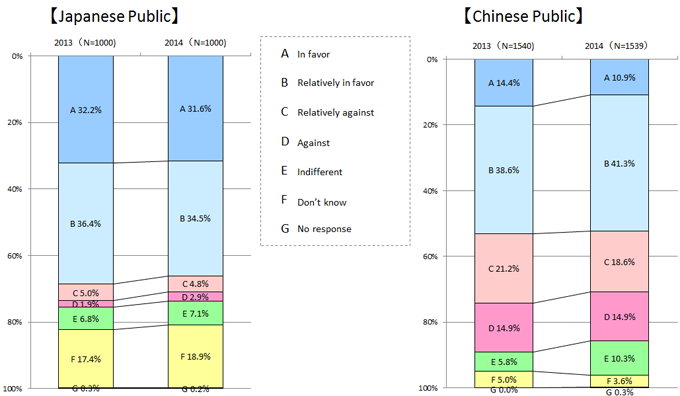
Views about Visits to Each Other's Country
70% of Japanese and Chinese "do not want to visit" each other's country
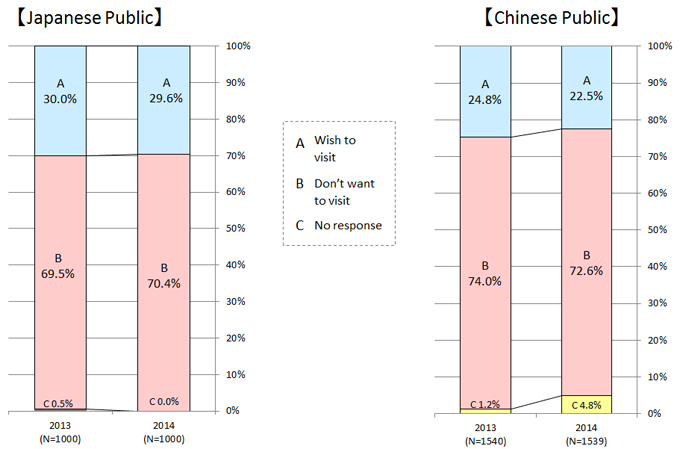
Views about Civil Sector Exchange among Japanese and Chinese Peoples
Many Japanese expect civil-sector exchange as a venue for "mutual understanding" between the peoples of Japan and China" while many Chinese expect it as a basis for the expansion of "common benefits."
Also for Chinese respondents, "Important" was at a high level with 63.4% (67.7% last year), both the Chinese and Japanese public recognize the importance of private and direct interaction.
Among the reasons why private and civil exchange was "important," "expand mutual understanding between Japanese and Chinese people through interaction" (70.7%, 66.2% last year), and "to deepen practical understanding of China" (66.8%, 60.6% last year) were the most common answers by the Japanese respondents, which indicates that they regard private interaction and civil exchange as vital for "mutual understanding."
On the other hand, since 56.7% (46.0% last year) of the Chinese respondents chose the answer "To gain the basis for expanding mutual benefit," they expect the function of "expanding mutual benefit" to be civil interaction and exchange rather than understanding each other. It is also noticeable that since the answer "To have grounds to complement diplomatic relations" remains at a lower level (13.0%, 22.0% last year), the Chinese public expect idiomatic roles for civil interaction and exchange that differ from clearly diplomatic relations by the governments.
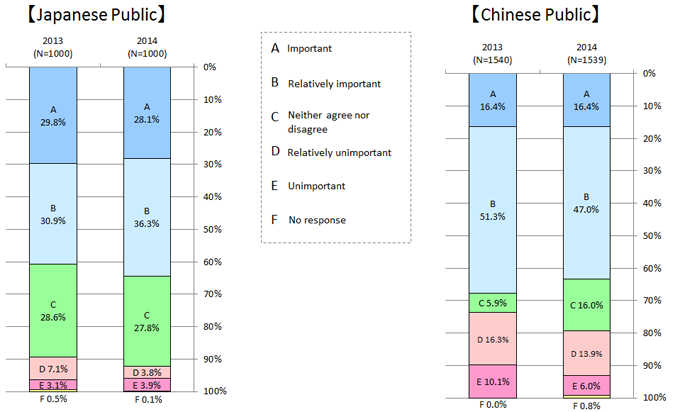
The Effectiveness of Diplomatic Relations and the Necessity for Japan-China Summit
Almost half of the Japanese public thinks that the current diplomatic relations between Japan and China are not being conducted effectively, and the same opinion exists in China at around 30%. More than half of the Japanese and Chinese public think a Japan-China summit is necessary. There are higher expectations in Japan for a summit while almost 40% of Chinese respondents think that it is not "necessary."
On the other hand, 13.7% of the Chinese responded that the diplomatic relations were "being conducted effectively," and 37.3% chose "relatively being conducted effectively." A total of 51.0% considers that diplomatic relations are effective. That said, it must also be noted that "not being conducted effectively" (7.6%) and "relatively not being conducted effectively" (22.0%) are also sizable at nearly 30%, which indicates that the 29.6% of the Chinese evaluate that diplomatic relations are not effective. Close to 20% (19.1% "neither effective nor not effective") of Chinese respondents withheld their judgment on this matter.
As to why diplomatic relations were not effective, two responses stood out. Most Japanese (72.8%) attributed the ineffectiveness to antagonism toward recognition of history and territory followed by the attitudes of China's political leaders (57.5%). The most popular responses among Chinese polled were antagonism toward recognition of history and territory (55.4%) followed by the political attitude of Japan's leaders (47.7%). Nearly 40% (39.5%) of Japanese respondents and 15.4% of Chinese cited the political attitude of their leaders.
The percentage of Japanese who replied that the summits, which have not been held since May 2012, were necessary was 64.6% (2013: 64.9%). The percentage who felt they were unnecessary was less than 10%.
By contrast the percentage of Chinese who replied that the summits were necessary exceeded 50% at 52.7% but had markedly declined from 57.1% last year. The percentage who felt the summits were unnecessary approached 40% (37.1%, 2013: 37.3%). The perceptions between the two countries are quite different.
When asked what issues should be discussed if a summit was held, the most popular response among Japanese was for a broad ranging discussion on how to improve relations between both countries (45.8%). This answer was followed by "the territorial dispute over the Senkaku Islands" (32.2%). Only 13.9% feel that "historical understanding" should be on the agenda.
Among Chinese respondents the territorial dispute over the Senkaku Islands was cited most often (45.8%) followed by the Japanese recognition of historical issues (38.1%). There were also a relatively sizable 35.7% of respondents who chose the option "a broad ranging discussion on how to improve relations between both countries."
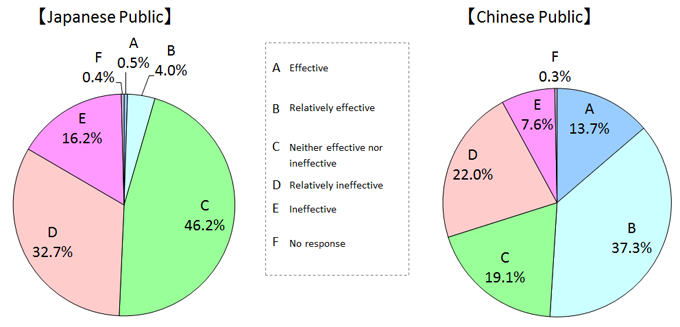
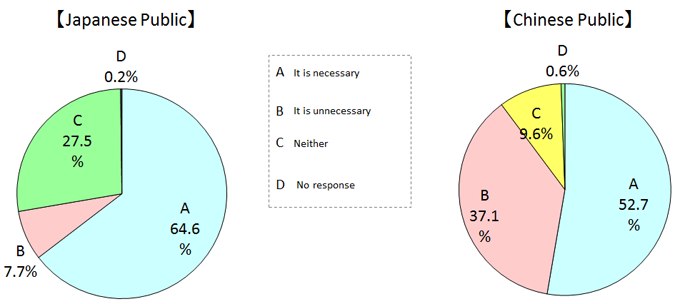
Views on Historical Issues among Japanese and Chinese Peoples
Japanese public have pessimistic views and Chinese have relatively optimistic views on the issue of historical understanding.
Conversely the optimistic view was the most popular response among Chinese respondents at 34% (2013: 35.4%). The percentage of respondents that felt bilateral relations will not develop unless historical issues are resolved was 31.4% (2013: 37.9%), which shows a decrease from last year. The percentage who felt that "it will be difficult to resolve historical issues even after bilateral relations develop," the most popular answer for Japanese, was just about a quarter at 26.9% (2013: 24.1%).
Asked specifically what must be resolved among the historical issues between the two countries, the percentage of Japanese respondents that cited "China's anti-Japanese education and criticisms of Japan's past acts in textbooks in Chinese schools" was 56% (2013: 58.6%), followed by "the Chinese media's news coverage of Japan," which polled 43.1% (2013: 43.4%). What is also evident was that there were about 20% of respondents who cited faults in Japan itself such as "Japan's perception of its invasions of China in the 20th century" (25.7%, 2013: 26.4%) and "the depiction of history in textbooks in Japanese schools" (16.8%, 2013: 20.0%).
When Chinese respondents were asked what historical issues they felt had to be resolved, although some have decreased from last year, the majority of popular responses were related to Japanese recognition of history. The need for Japan to recognize and apologize for its past invasions was the most common response (54.8%, 2013: 61.0%).
In comparison to the percentage of respondents who found fault with Japan, the percentage that found fault with China was comparatively small: 28.1% cited the need for history education to be fair and objective in China (2013: 28.5%), 10% cited "the need for Chinese politicians to refrain from inappropriate remarks or behavior" (2013: 9.0%), and 3.6% cited "the need for the Chinese media to practice fair and objective news coverage of Japan" (2013: 4.2%).
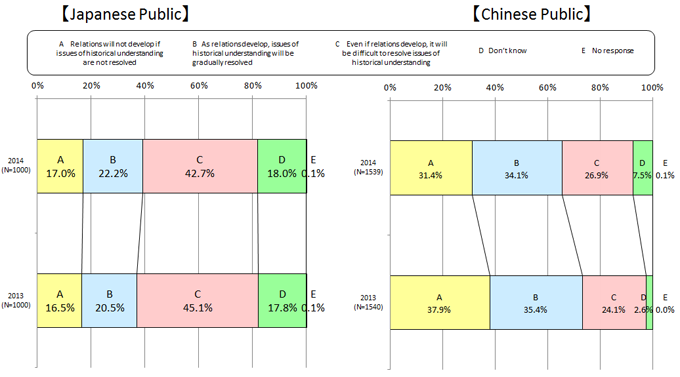
Japanese Prime Ministers' Visits to Yasukuni Shrine
70% of Japanese approve of the visits, but 60% of Chinese are opposed to Japanese prime ministers visiting Yasukuni Shrine, regardless of whether a visit is made publicly or privately.
The percentage of Chinese respondents who felt Japanese prime ministers "should not visit the shrine in any capacity" was unchanged at approximately 60% (59.5%, 2013: 62.7%). If the percentage of Chinese who saw no problem if the prime minister visited the shrine officially (8.2%, 2013: 9.0%) is added to the percentage who saw no problem if the visit is in a private capacity (20.9%, 2013: 20.4%), then the percentage tolerant of some kind of visit does not reach 30%.
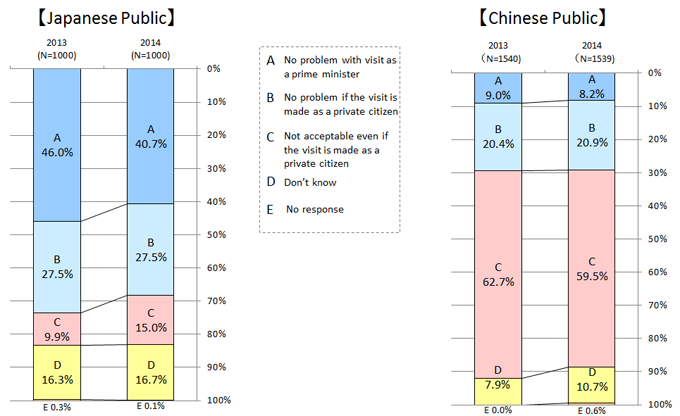
The Senkaku/Diaoyu Islands and Territorial Dispute
The China poll shows a harder line toward the territorial dispute
However, the ideas for resolution of the territorial dispute differ significantly between Japanese and Chinese. The most popular solution to resolve this territorial dispute among Japanese polled was that "the two countries should promptly proceed toward negotiations with a view to resolve their issues by peaceful means" (48.4%, 2013: 49.1%) and this is followed by "Through diplomatic negotiation, Japan should be made to acknowledge the existence of the territorial dispute" (41.2%, 2013: 42.4%). The next most popular solution was that the matter should be taken to the International Court of Justice to be resolved in accordance with international law (41.2%, 2013: 42.4%).
The most popular response among Chinese was that "to protect its territory, China should increase its effective control over it" (63.7%, 2013: 58.1%) and this is followed by "Through diplomatic negotiation, Japan should be made to acknowledge the existence of the territorial dispute" (41.2%, 2013: 42.4%). The will to resolve the dispute by legal means or peaceful negotiation has weakened and the percentage who responded that "the matter should be taken to the International Court of Justice to be resolved in accordance with international law" fell from 20.1% last year to 13.7% this year, and those who responded "Both countries should promptly proceed toward negotiations in order to resolve their issues through peaceful means" also fell from 43.6% to 32.6%. Yet, it is also worth noting that 27.1% of Japanese respondents and 26.1% of Chinese respondents cited "prevention of an armed conflict must come before any hasty attempts to resolve the issue."
Respondents in both countries (63.1% of Japanese (2013: 67.7%) and 66.9% of Chinese (2013: 82.3%)) believe that the conflict between Japan and China over the Senkaku Islands influences the economies of both countries.
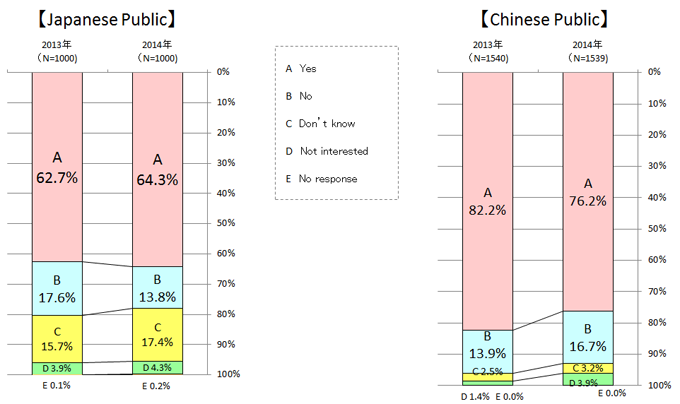
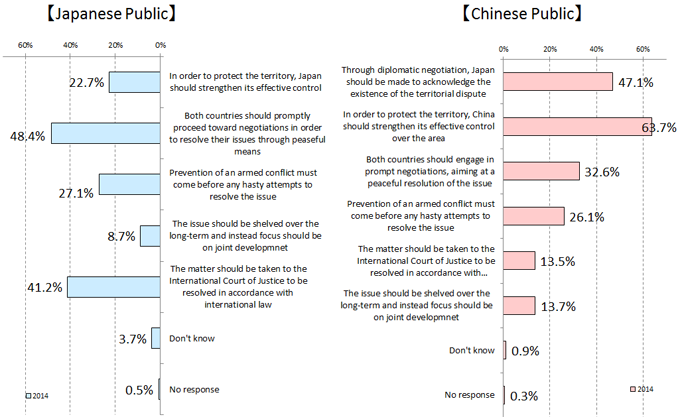
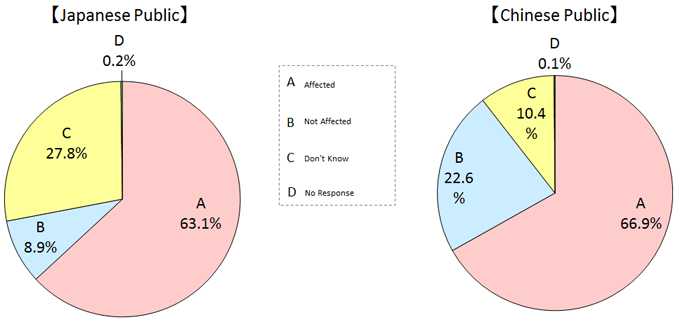
Perception on Military Threats
Japan and China increasingly see one another as a military threat. For Japan, China and North Korea, and for China, Japan and the United States are perceived as countries that pose the same level of military threat.
The Chinese public feel the strongest military threat from "the United States," yet as a result of a decrease in those answering "the United States" from 71.6% last year to 57.8%, the answer "Japan" (55.2%, 53.9% last year) became one of the highest military threats as perceived by the Chinese public.
As for the reasons why the Japanese respondents felt there was a military threat from "China," "repeatedly infringe upon territorial waters of Japan" was the most common with 71.9% (71.4% last year). This is followed by "the conflict between Japan and China over the Senkaku Islands and marine resources" (65.2%, 62.6% last year) and "Continuous military buildup in China" (53.8%). In short, the existing tension in the East China Sea and expansion of Chinese military action in the area are the reasons why the Japanese public feel a military threat from China.
In the reasons given by the Chinese respondents who answered that they feel Japan is a military threat, the most common answer was "Japan's attempt to besiege China on a military front in cooperation with the United States," which showed a significant increase from 44.6% last year to 58.2%. "Japan's lack of a proper apology and remorse over the history of invasions of China" (52.4%) and "Although it effectively occupies the Diaoyu Islands, Japan does not recognize the territorial dispute" (51.9%) followed the answer. The ratio of Chinese respondents who answered that "Since the ratification of the right to collective self-defense, the move to amend the article on peace in the Japanese Constitution has strengthened, and it can be actualized" has increased from 4.7% last year to 14.5%. This can be seen as a reflection of the current Japanese political moves on its security agenda.
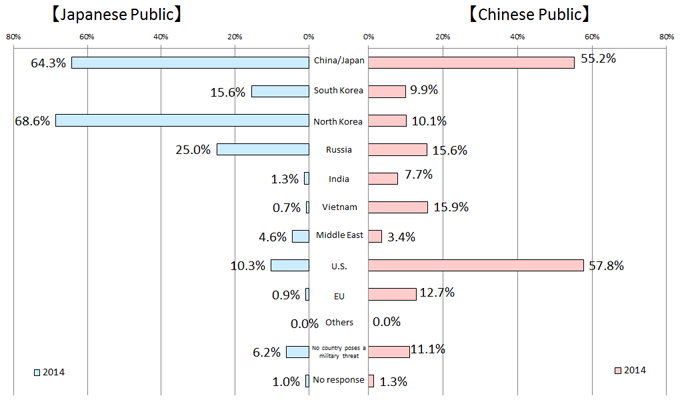
The Possibility of Military Conflict between Japan and China
The fear of a sudden military conflict is spreading in both countries
Among the Chinese respondents, 42.2% think that "There will be conflict in the future" and 11.2% think "There will be conflict within a few years." In total, more than half of Chinese respondents (53.4%) perceive the possibility of a military conflict between Japan and China.
On the question for the necessity of a multilateral framework for East Asian security cooperation, while 47.2% of the Japanese respondents answered that it is "necessary," the Chinese respondents who chose "Necessary" have decreased from last year's 54.0% to 43.0% and "Not necessary" have increased from 34.1% (last year) to 38.7%. In Japan, just less than half of the respondents agreed to the proposal, yet in China, the divide in opinion became evident. However, even though the multilateral framework is considered as necessary by some, there is no consensus on "which nation-states should participate in the framework."
In Japan, "Japan," "China" and "South Korea" are prominent with over 80%, which indicates general public opinion that the multilateral framework for East Asian security cooperation should be formed among Japan, China and South Korea. At the same time, additions of "the United States," "North Korea" and "Russia" are supported by more than half of the Japanese respondents.
On the other hand, 80.4% (73.7% last year) of the Chinese respondents supported China's participation in the multilateral framework. Apart from China, "Russia" has increased from 38.3% last year to 57.4%. With "the United States" (51.2% and 54.2% last year), these are the only countries whose participation is supported by more than half of the Chinese respondents. "Japan" and "South Korea's" participation were expected by 43.1% and 39.1%, respectively.
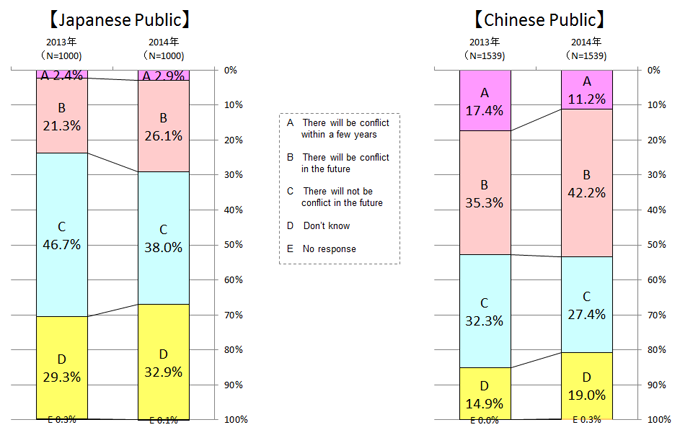
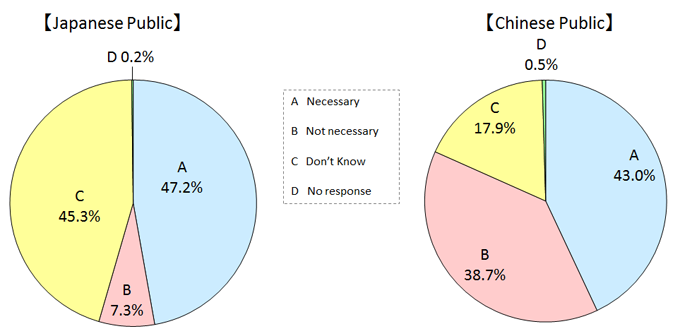
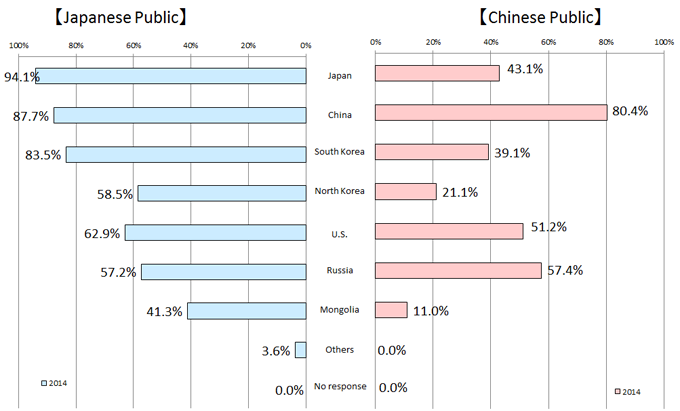
Countries and Regions That Will Lead Future World Politics
Further intensification of "G-2" consciousness in China
In the Chinese public's idea of "the country and region that will lead future world politics" while "the United States" had been the most popular and had been followed by "China" in the past, in this year's survey, "China" has become the most popular answer at 41.8% (41.6% last year) and "the United States" has decreased from 42.7% last year to 31.3% this year. The Chinese consciousness that China and the United States will lead the world is the same as last year, yet this year, they are begging to picture the future with stronger Chinese leadership.
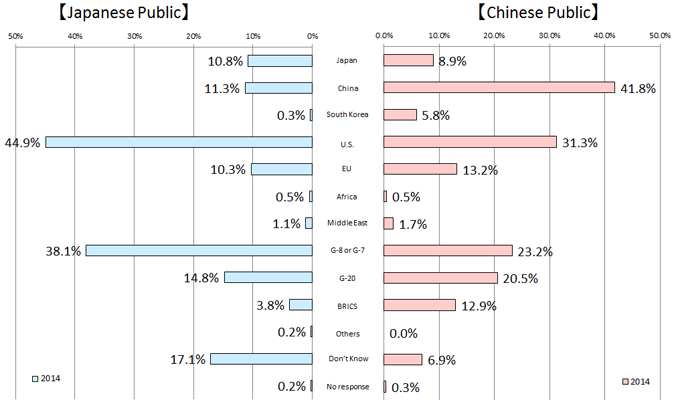
What Will Happen to Japan and China in 2030?
More than half of the Japanese and Chinese public hope to have peaceful coexistence and co-prosperity, but at the same time they are unsure if it can be realized. More than 30% of the Japanese respondents question the smooth growth of the Chinese economy until 2030 while more than half of the Chinese respondents see Japan's economic power declining by 2030.
In the Japanese public's projection on the Chinese economy in 2030, "It will be difficult for the Chinese economy to continue its smooth growth and its future is exceedingly uncertain" was the most common answer at 34.4% (29.3%), and it was followed by "The Chinese economy will continue to grow, but it will be difficult to match the U.S." at 23.0%. Only 5.1% of the Japanese respondents think that "China will surpass the U.S. and become the greatest economic power in the world".
In the projection on the Japanese economy, most of the Chinese (28.1%) answered that "Japan, as the third-greatest economic power in the world, will not become a military power," which increased from 24.4% last year. This was followed by "Both Japan's rank and influence as an economic power will decline" at 24.6% (33.1% last year), and in addition with 23.6% saying "The rank of Japan as an economic power will fall, but its influence will be maintained," close to half of the Chinese respondents saw "Japan's status as an economic power will decline."
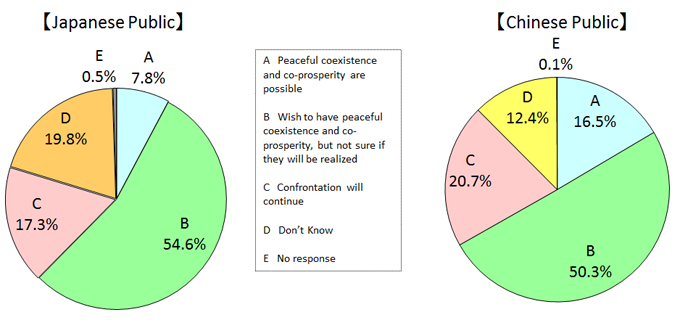
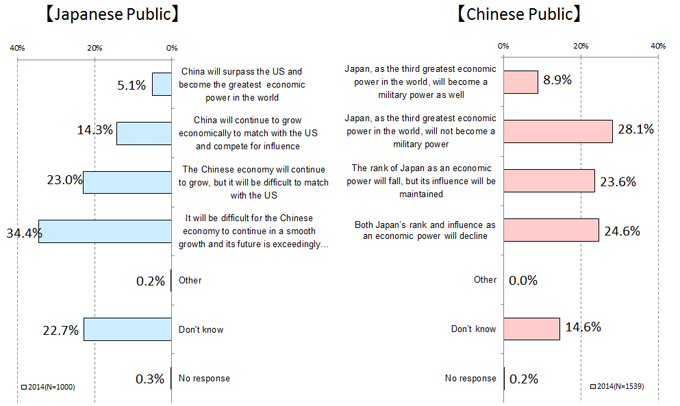
On Economic Relations between the Two Countries
On the economic relations between Japan and China, the Japanese public sees it as zero sum while the Chinese think it is complementary.
On the other hand, the Chinese respondents who answered that "Economic relations between the two countries complement one another, thus a win-win relationship can be constructed" have increased from 58.6% last year to 62.9% this year (including "Agree" and "Tend to agree"), which shows a positive vision on the Japan-China economic relationship and it differs from the Japanese public's pessimistic perception.
On the question of whether economic relations can distance themselves from the political confrontation between Japan and China, in Japanese public opinion, "Cold political and cold economic relations" (36.2%, 40.1% last year), and "Cold political relations but hot economic relations" (35.3%, 32.1% last year) are on the same level. On the other hand, in Chinese public opinion, the view that "Cold political and cold economic relations" will prevail exceeded half of the responses at 52.7% (56.5% last year), which was significantly higher than the view that "Cold political relations but hot economic relations" can be maintained (38.9%, 38.3% last year).
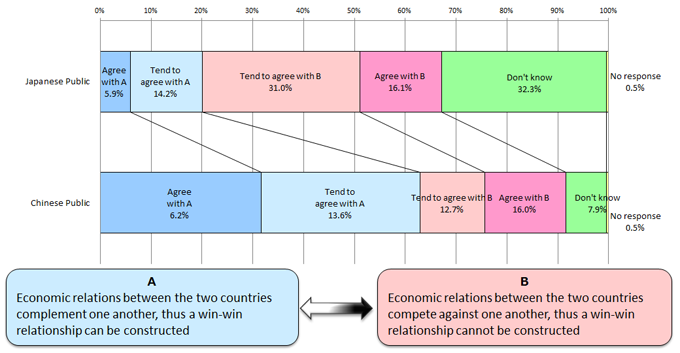
Perception on Freedom of Speech and Freedom of the Press in Each Other's Country
The Japanese and Chinese public think that "freedom of speech and the press do not exist, or are effectively controlled" in one another's countries.
On the other hand, 57.1% (49.7%) of the Chinese respondents think that "Freedom of the press is effectively controlled in Japan" and it has increased from last year. Although the perception that "there is no freedom of the press and speech in Japan" has decreased from 15.7% last year to 20.3%, still about 70% of the Chinese public consider that there is no freedom of speech and the press, or they are effectively controlled in Japan.
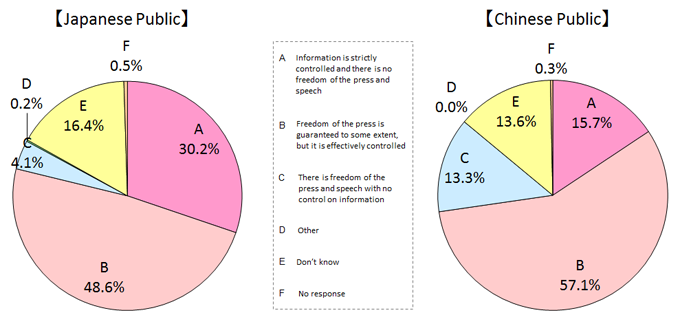
Objectivity of Domestic Media
70% of the Chinese public consider the domestic media's coverage of Japan-China relations as "objective and impartial" while only less than 30% of the Japanese public consider Japanese media coverage as "objective and impartial."
In China, 73.9% (84.5% last year) of the respondents think that the Chinese media's coverage of Japan-China relations is "Objective and impartial," which is in contrast with the Japanese result. Yet, it is worth noting that "Neither objective nor impartial" has increased from 7.5% last year to 13.3% this year.
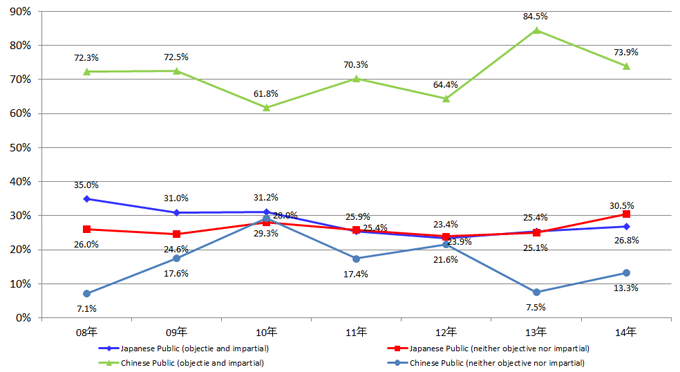
Opinions on the Internet and Public Opinion
More than half of the Japanese and Chinese public say that opinions on the Internet do not reflect general public opinion.
Also among the Chinese respondents, "The Internet does not appropriately reflect public opinion" was 50.9% (46.1% last year) while "The Internet appropriately reflects public opinion" decreased nearly 10 percentage points from 47.5% last year to 38.6% this year.
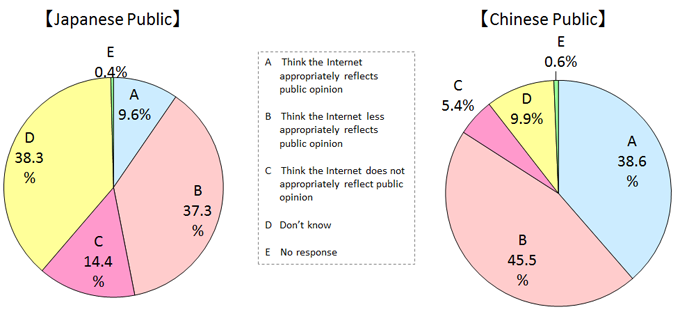
The Degree of Interaction between Chinese and Japanese people
No improvement on scarce direct interaction between Japanese and Chinese public for the tenth consecutive year
Japanese public's perception of China depends on domestic TV news
The total of Japanese respondents who have close Chinese friends or Chinese acquaintances that they can converse with was 21.1% (20.3% last year). This indicates that the Japanese public who have visited China or who have direct interaction with Chinese acquaintances is about 20%, and this also has not changed throughout the 10 opinion polls.
On the extent of exposure to information on China, overwhelmingly 73.9% (76.1% last year) of the Japanese respondents answered that they "only receive information on China through Japanese media," whereas people who "have directly experienced Chinese culture" (10.7%, 8.6% last year), "have seen Chinese media (TV programs, newspapers or the Internet)" (13.7%, 10.9% last year) remain around 10%.
At the same time, the major Japanese public's information source on China is "Japanese news media" at 96.5% (95.0% last year). Within the 96.5%, 76.1% (79.7%) are receiving information from "TV." Therefore, there is a high probability that the Japanese public's impression and perception of China depend not on direct information such as a visit to China or conversation with Chinese people, but on Japanese media and TV in particular. This was also the same with the past opinion polls.
Chinese people's degree of direct interaction with Japanese is scarcer, yet information sources are varied for the formation of their perceptions of Japan: Apart from news media, use of dramas, movies and publications are also noticeable.
The overwhelming majority of the Chinese public (80.1%, 80.3% last year) receive information about Japan through Chinese media. However, the people who "have seen Japanese media (TV programs, newspapers or the Internet)" (23.7%, 14.7% last year), "have directly experienced Japanese culture" (17.0%, 8.6% last year), have noticeably increased since last year and these are at a higher level in comparison to the Japanese public.
There is also a difference in the trend on the source of information about Japan: While 91.4% of the Chinese respondents cited "Chinese news media" as a source of information (within which 78.8% chose "TV"), 61.4% (65.3% last year) chose "Chinese TV dramas and movies," and 37.4% (36.3% last year) chose "Chinese publications (including school textbooks)." This shows that there are relatively diverse information sources about Japan in China and this implies that most Chinese people form impressions and perceptions of Japan mainly through Chinese TV news complemented by Chinese TV dramas, movies and publications.
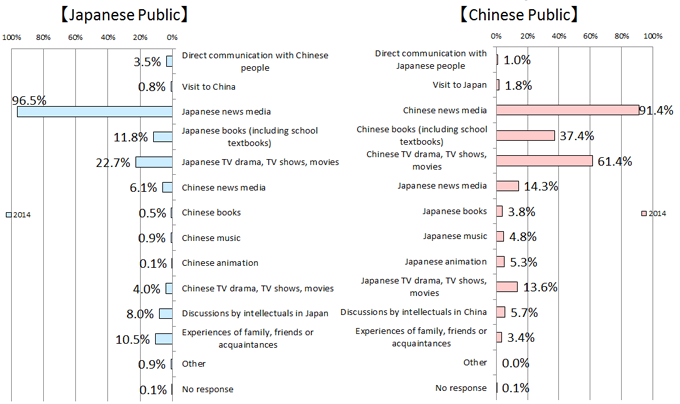













Post a comment